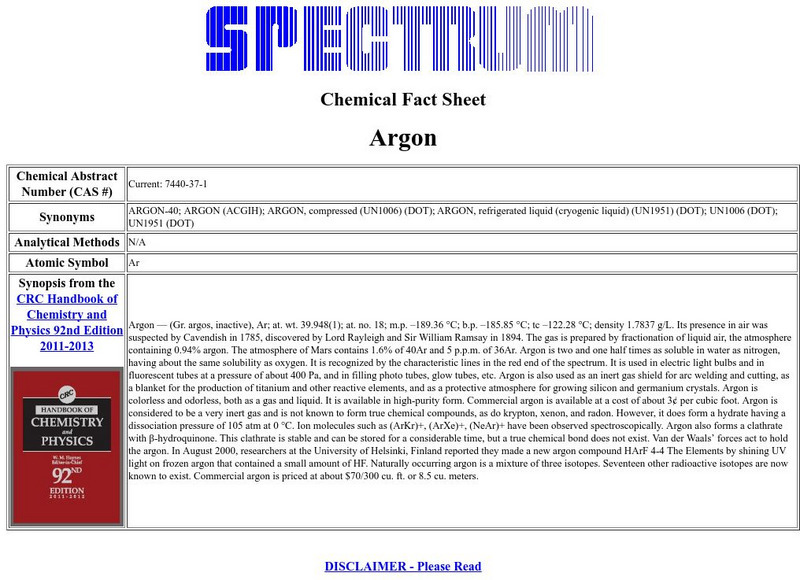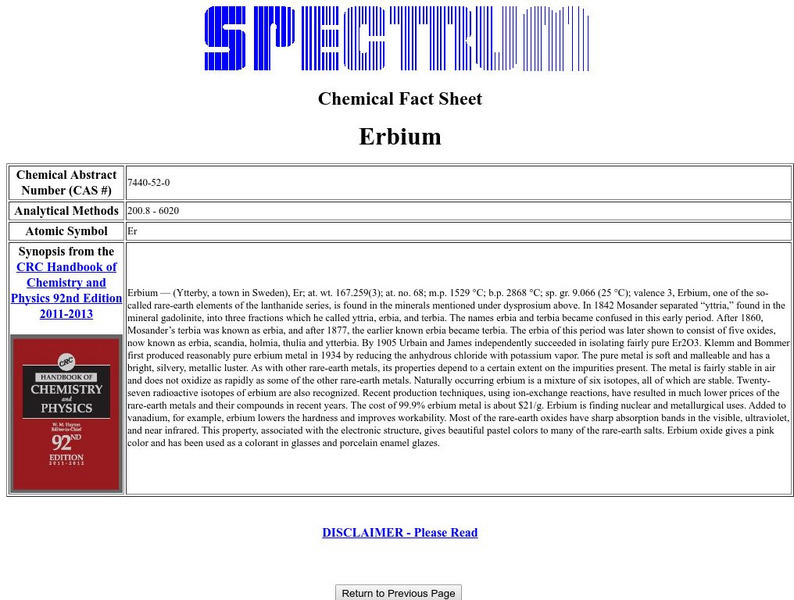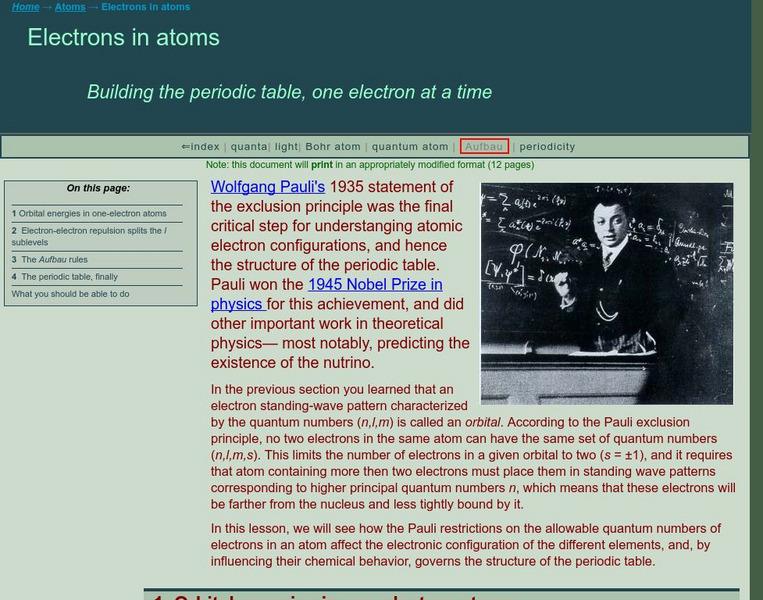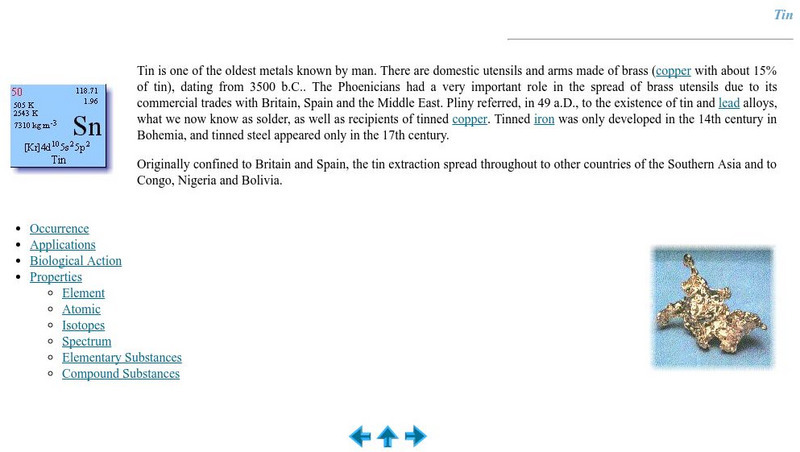Hi, what do you want to do?
Florida-Spectrum Environmental Services
Florida Spectrum: Chemical Fact Sheet: Scandium
This site provides a fact sheet with information on the basic data and properties of Scandium. It also includes some of its uses.
Florida-Spectrum Environmental Services
Florida Spectrum: Chemical Fact Sheet: Strontium
This site provides a fact sheet with information on the basic data and properties of Strontium. It also includes some of its uses.
Florida-Spectrum Environmental Services
Florida Spectrum: Chemical Fact Sheet: Curium
This site provides a fact sheet with information on the basic data and properties of Curium. It also includes some of its uses.
Florida-Spectrum Environmental Services
Florida Spectrum: Chemical Fact Sheet: Mendelevium
A summary of the basic data on mendelevium, its isotopes and basic properties.
Florida-Spectrum Environmental Services
Florida Spectrum: Chemical Fact Sheet: Indium
This site provides a fact sheet with information on the basic data and properties of Indium. It also includes some of its uses.
Florida-Spectrum Environmental Services
Florida Spectrum: Chemical Fact Sheet: Iridium
A summary of the basic properties and uses of iridium, as well as a few random facts about it.
Florida-Spectrum Environmental Services
Florida Spectrum: Chemical Fact Sheet: Aluminum
A summary of information on aluminum, including history, basic data, uses and environmental impact.
Florida-Spectrum Environmental Services
Florida Spectrum: Chemical Fact Sheet: Americium
Some basic data stressing isotopes and decay information of americium. Thorough.
Florida-Spectrum Environmental Services
Florida Spectrum: Chemical Fact Sheet: Antimony
Very thorough assembalage of data on antimony, its properties, uses and sources. Detailed.
Florida-Spectrum Environmental Services
Florida Spectrum: Chemical Fact Sheet: Argon
A very thorough summary of basic information on argon, including sources, uses, isotopes and properties.
Florida-Spectrum Environmental Services
Florida Spectrum: Chemical Fact Sheet: Arsenic
Good site for basic data and uses of arsenic with an especially thorough summary of environmentally relevant information.
Florida-Spectrum Environmental Services
Florida Spectrum: Chemical Fact Sheet: Erbium
This site provides a fact sheet with information on the basic data and properties of Erbium. It also includes some of its uses.
Florida-Spectrum Environmental Services
Florida Spectrum: Chemical Fact Sheet: Fermium
This site provides a fact sheet with information on the basic data and properties of Fermium. It also includes some of its uses.
Florida-Spectrum Environmental Services
Florida Spectrum: Chemical Fact Sheet: Fluorine
This site provides a fact sheet with information on the basic data and properties of Fluorine. It also includes some of its uses.
Florida-Spectrum Environmental Services
Florida Spectrum: Chemical Fact Sheet: Francium
This site provides a fact sheet with information on the basic data and properties of Francium. It also includes some of its uses.
Florida-Spectrum Environmental Services
Florida Spectrum: Chemical Fact Sheet: Zirconium
This site provides a fact sheet with information on the basic data and properties of Zirconium. It also includes some of its uses.
Florida-Spectrum Environmental Services
Florida Spectrum: Chemical Fact Sheet: Silicon
This site provides a fact sheet with information on the basic data and properties of Silicon. It also includes some of its uses.
Florida-Spectrum Environmental Services
Florida Spectrum: Chemical Fact Sheet: Vanadium
This site provides a fact sheet with information on the basic data and properties of Vanadium. It also includes some of its uses.
Florida-Spectrum Environmental Services
Florida Spectrum: Chemical Fact Sheet: Molybdenum
A great deal of basic data on molybdenum and its properties. There is also lots of information relating to uses and environmental concerns surrounding this metal.
Florida-Spectrum Environmental Services
Florida Spectrum: Chemical Fact Sheet: Mercury
A great deal of information on the uses and appliactions of mercury, along with some basic data and physical and chemical properties. Very thorough.
Chem4kids
Chem4 Kids: Alkali Metals to the Left
To the left. To the left. The elements in the left column of the period table are alkali metals with the exception of hydrogen. This is a brief overview of the alkali metals, what their family is all about and how well they bond or do...
Simon Fraser University
Chem1 Virtual Textbook: The Aufbau Rules
Acting as a subtopic of the General Chemistry Virtual Textbook's section on Atoms and the Periodic Table, this site discusses atomic electron configurations. Specifically, the Aufbau rules are discussed with information on energies of...
University of Kentucky
Uk: Potassium Comics
Although this page focuses more on fun than on facts, it will quickly become a favorite of most Chemistry students. Find scanned panels and pages of comic books with elemental characters.
Other
Divulgacao Da Ciencia: Tin
Here you will find a series of clear pages, dedicated to elemental information. Pages include; history, occurrence, biological action, and properties.




























